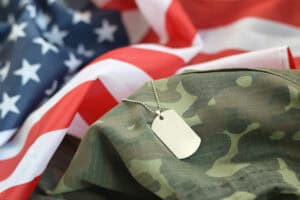SPRINGFIELD – Last year, Thomas D. Osborn faced a 30-day wait for a needed medical appointment through the VA Central Western Massachusetts Healthcare System. He decided to see a physician in the private sector, and that decision saved his life.
“It was a critical health issue and the doctor told me that day it was good I came in, as I would have been dead in 30 days,” said Osborn, who served with Special Forces for eight years during the Vietnam war.
The Holyoke resident, along with wife Frances Welson, were among some 90 participants in attendance Wednesday night at what the Northampton-based system billed as a Stakeholder Town Meeting at La Quinta Inn & Suites. An estimated 72 veterans, from different eras of military service, listened to retired Army Col. John P. Collins, the system’s newly appointed director, give an overview of the system, which includes a medical center and five outpatient clinics, and then respond to questions. Last year, the Veterans Administration Medical Center, in Leeds, was ranked the 10th worst VA hospital in the nation for new patients waiting for health care from a specialist.
“Your input is important, the good, the bad, the ugly,” said Collins who appeared attentive to the feedback that indicated the delivery of efficient, cost effect care to veterans remains a work in progress. Whistle blower disclosures last spring revealed widespread dysfunction and corruption throughout the U.S. Department of Veteran Affairs massive healthcare system. Long delays in patient access to care, falsification of records to cover up such delays and possible deaths related to such delays resulted in Congressional action and the resignation of the department’s secretary, as well as other top department officials. Funds to hire additional health care providers were allocated, as well as to allow veterans access to care in the private sector.
“Your voice is going to shape what we do,” Collins told area veterans who responded with stories of phone calls to patient coordinators not returned, inadequate home care for veterans because contracted providers are not being paid and limited access to specialized care in the Pioneer Valley area. Eric Segundo, who served in Iraq and who is now director of veteran services for the Town of Ludlow, struck a chord when he said he has seven older veterans who have to travel to West Haven, Conn., a distance of 92 miles, for care within the VA system.
Collins acknowledged that the new “Choice Card,” which allows veterans to use providers outside the VA system, has somewhat limited use in Massachusetts, and that this is an issue he “struggles with.” It is cheaper and more streamlined, he said, when veterans receive care within the VA system, but Collins’ system has contracts with other systems, including Cooley Dickinson Hospital, in Northampton, and he hinted that he might expand such outside coverage. Veterans, with a Choice Card, may also elect to use a private provider if they cannot get a needed appointment, within the system, within a 30-day period. A recent report on NPR revealed disparities, within states like Massachusetts, on how much is spent on veterans’ healthcare, related to their proximity to VA facilities.
Collins was also open to suggestions that the VA primary care clinic in Springfield consider hours of operation that might include a weekend or evening time period to accommodate patients’ work schedules.
“Yes, anything is possible, like extended hours. I will look into that,” said Collins who, at times, seem to be addressing both veterans and VA staff. “Just tell me how to get there, and not the barriers. If we all agree it is a good idea, tell me what the cost is.”
Other VA staff members present included Dr. Neil Nusbaum, medical chief, Dr. Lauren Proctor, of the Springfield clinic, and MaryAnn Lyman, business office manager. Boston-based Curtis Evans, of the Veterans Benefits Administration, also addressed the meeting.
Bryan Doe, of the Springfield Vet Center, which is part of the Department of Veterans Affairs, as well as other veteran services directors, which are funded by the state, and serve cities and towns, were present.
Collins said he would invite a representative from the Soldiers’ Home in Holyoke to attend a future town hall style meeting, as another audience member suggested.
Segundo, Ludlow’s veteran services director, said he was “optimistic” about Collins’ leadership, and the possibility of veterans being able to access care “outside the VA system,” rather than being shuttled 92 miles across state lines. With a background in healthcare management, Collins served as chief of military health care in Europe, and also spent a year in doing similar work in Afghanistan.
“He is from the trenches; he understands,” said Segundo. “He seems willing to answer questions and to help us.”
Vietnam veteran Osborn said he found the meeting informative in learning what other services, outside the VA system, are available, as veterans services directors assist veterans in a variety of ways as well. Osborn said he also felt the VA may be “waking up” to better serving veterans.
“There are really good people at the VA, but it is a bureaucracy and that has a negative connotation. Bureaucracies are large elements difficult to move, and the question is whether they can move fast enough.”
A similar town hall meeting will be held, in Worcester, on Jan. 28, from 5 to 8 p.m. at the University of Massachusetts Medical School. The VA is using a campus building as an annex where veterans may obtain specialty care, in addition to the VA clinic in that city, and is planning future joint ventures with the medical school.
VA Central Western Massachusetts Healthcare System serves approximate 25,500 veterans at its Northampton main facility in Leeds section of Northampton, and its outpatient clinics in Worcester, Springfield, Fitchburg, Greenfield and Pittsfield.
More information is on the system’s Facebook page.





